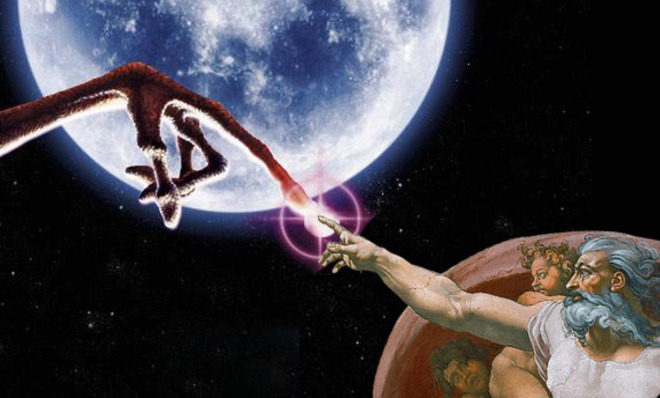Could religion survive contact with extraterrestrials?
A pair of new books contend that it could. But the implications of such a discovery would surely destroy religion as we know it.


I'll be honest with you: I think it's extremely unlikely that humanity will ever make contact with intelligent life from another planet. I possess no special expertise on the subject. It's just that my inveterate skepticism tells me that the stupefying vastness of space combined with the relative rarity of evolution producing species capable of interstellar communication — let alone travel — will make such contact extremely unlikely.
My skepticism isn't widely shared. Aside from the UFO industrial complex and the enormous number of science-fiction novels, films, and television franchises that imagine a universe teeming with technologically advanced civilizations, there are now a pair of books — and a number of essays about and reviews of those books — that reflect seriously on how the major religions of the world would respond to first contact with extraterrestrial life.
From this range of writing, a broad consensus emerges. Buddhism, as a nontheistic belief system, would be largely unshaken by the discovery of intelligent life on other worlds. Among Christians, the Vatican's long history of adjusting itself to the findings of modern science would lead Catholics to be relatively unfazed. More literalistic Protestants — especially evangelicals of various stripes — would have a much harder time of it, while certain sects with origins in 19th-century America (Seventh-Day Adventists, Jehovah's Witnesses, Mormons), which already have folk beliefs about the existence of life on other planets, might actually thrive.
The Week
Escape your echo chamber. Get the facts behind the news, plus analysis from multiple perspectives.

Sign up for The Week's Free Newsletters
From our morning news briefing to a weekly Good News Newsletter, get the best of The Week delivered directly to your inbox.
From our morning news briefing to a weekly Good News Newsletter, get the best of The Week delivered directly to your inbox.
I'm afraid I'm skeptical about much of this, too. Yes, Buddhism and other nontheistic forms of spirituality might emerge relatively unscathed from a close encounter with extraterrestrial life. But most forms of Christianity (like Judaism and Islam) would be profoundly shaken by the definitive demonstration that life — let alone intelligent life — exists elsewhere in the universe.
Consider the theological implications of discovering even the most primitive form of microscopic unicellular life on another world (perhaps in the polar ice caps on Mars, or in a subsurface ocean of water on Jupiter's moon Europa). Such a discovery would seem to vindicate the evolutionary hypothesis that life can and does emerge from (seeming) nothingness all on its own, without divine intervention of any kind. And that would raise the possibility — perhaps a greater possibility than ever before in the minds of believers — that precisely the same thing could have happened on Earth.
In order to shoot down this theologically troubling possibility, believers could always leap to the view that God lies behind all life everywhere. But surely that would complicate the Judeo-Christian creation story in ways that go far beyond the usual debates about reading the Book of Genesis literally or allegorically. Wouldn't it have been more accurate for the text to speak of God creating a universe containing many worlds with life on them instead of implying that life on our planet is somehow unique?
But theological adaptation to the discovery of simple extraterrestrial life is one thing. Adapting to the discovery of intelligent life elsewhere in the universe would be something else entirely — and I seriously doubt that most of the world's great theistic faiths could succeed in pulling it off, at least short of a truly radical shift in orientation.
A free daily email with the biggest news stories of the day – and the best features from TheWeek.com
Think of it as a theological Copernican Revolution. Just as the scientific Copernican Revolution destabilized and downgraded humanity's place in the cosmos by substituting heliocentrism for a geocentric view that placed the Earth and its inhabitants at the center of creation, so the discovery of advanced life on other planets would imply that human beings are just one of any number of intelligent creatures in the universe. And that, in turn, would seem to imply either that God created many equally special beings throughout the universe, or that God cares for us more than he does for those other intelligent beings.
How the latter view could be rendered compatible with basic tenets of monotheism (including divine omnipresence, omnipotence, and omnibenevolence) is beyond me. Did God create those other intelligent creatures, too, but without an interest in revealing himself to them? Or did they, unlike human beings, evolve all on their own without divine origins and guidance?
How believers answer those questions will be a product, in part, of what the extraterrestrials look like. If the aliens have symmetrical body structures — two legs, two arms, two eyes, two ears, two nostrils — then it may be plausible to assume that they were created in the image and likeness of the same God as we were. But if they look nothing like us at all, the case for separation between "our" God and these alien intelligences would grow much stronger.
But I have an equally hard time accepting that believers would be capable of wrapping their heads around the possibility that God loves all intelligent creatures on all planets equally. Does God send Moses, Jesus, and Mohammed to visit other worlds to deliver the same moral and theological revelations? Or does he raise up analogous prophets — and in the case of Christianity, incarnate himself in extraterrestrial species — in order to spread his message to everyone throughout the universe who is capable of receiving it?
I suspect that these puzzles are so corrosive in their skeptical implications that contact with intelligent life from other worlds would produce a rapid collapse of faith rooted in the Hebrew Bible, New Testament, and Quran, with a rapid spread of atheistic secularism in their place.
But not necessarily. Here are two other options.
One possibility would be a growth in the kind of philosophical theism David. B. Hart defended in his recent outstanding book The Experience of God. This would be a form of Platonism, with God treated less as a person who intervenes and reveals himself miraculously and providentially in history than as the ontological unity of Plato's three transcendentals: the True, the Good, and the Beautiful. God in this sense stands behind the scenes, invisibly making possible and sustaining every entity and action in the universe — here as well as on any conceivable alien world — from the beginning to the end of time.
But there is another possibility — one that moves in the opposite direction, toward greater divine anthropomorphism. Here Mormons may be able to offer some guidance. Some Latter-day Saints (including, on some readings, Mormonism's founding prophet Joseph Smith) have claimed that God resides within the universe rather than serving as its transcendent ground, that he began as a human being and evolved into his current state of exaltation, that he has a body, that he didn't create the universe so much as form parts of it from preexisting matter, and that Mormon men and women can themselves evolve into gods and goddesses. Such a view — with its hints of polytheism and suggestion of finite divine power — would seem to be far more compatible than traditional Judeo-Christian monotheism with a vision of the universe populated by a multitude of intelligent beings.
As I said at the outset, I don't think religious believers will ever have to cope with an extraterrestrially inspired theological crisis — because contact with intelligent life from elsewhere in the universe is exceedingly unlikely. But we shouldn't kid ourselves about the challenges that such contact would pose, if it were to happen, to the world's religious traditions.
I, for one, can think of no scenario more likely to turn us into a planet populated by convinced atheists — or devout Mormons.
Damon Linker is a senior correspondent at TheWeek.com. He is also a former contributing editor at The New Republic and the author of The Theocons and The Religious Test.
-
 5 redundant cartoons about Greg Bovino's walking papers
5 redundant cartoons about Greg Bovino's walking papersCartoons Artists take on Bovino versus bovine, a new job description, and more
-
 31 political cartoons for January 2026
31 political cartoons for January 2026Cartoons Editorial cartoonists take on Donald Trump, ICE, the World Economic Forum in Davos, Greenland and more
-
 Political cartoons for January 31
Political cartoons for January 31Cartoons Saturday's political cartoons include congressional spin, Obamacare subsidies, and more
